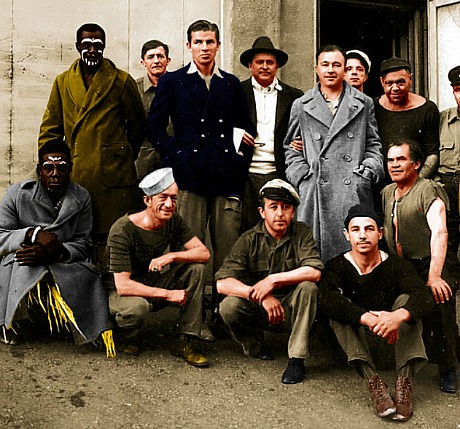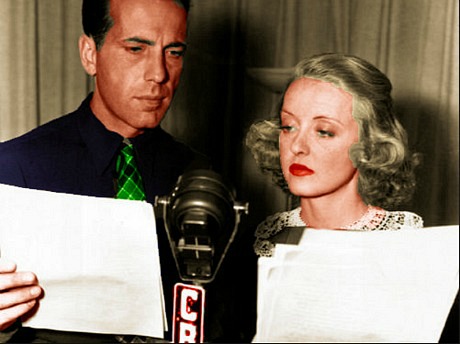 Jeffrey Wells
Jeffrey Wells
Chez Jay’s Loud, Clattery, Down-At-The-Heels ’70s Vibe
Early last evening the SRO and I visited Chez Jay, the legendary dive-bar eatery on Ocean Avenue. It’s still noisy as hell and the service faintly sucked, but the entrees are still delicious. The faintly grubby aura, reddish lighting, checked tablecloths, peanut shells on the floor, banners on the wall, thunky-sounding music system — walk through the front door and you’re Marty McFly in 1971. Chez Jay has been one of those lowdown, cool-cat, special-vibe places since ’59; very few Los Angeles establishments feel this time-machiney.

Last night around 7 pm, give or take.

I somehow managed to afford dinner there two or three times during my Los Angeles lost-weekend period in the mid ’70s, or right before I drove back east to work at becoming a film writer. This was when Chez Jay was a serious celeb haunt. Jack Nicholson (sporting the tight curly hair perm that he wore for The Fortune) and Lou Adler and a couple of women had the back table one night; I spotted a flannel-shirt-wearing Jeff Bridges during another visit.
I knew Jay Fiondella, the owner-founder and sometime actor, very slightly back then; every time I ran into him I’d mention how much I liked John Flynn‘s The Outfit (’73), in which he played a poker player who gets held up by Robert Duvall and Joe Don Baker.
Some Still Don’t Get It
I wasn’t interested in Cinefamily’s recent ten-year-anniversary screenings of Zodiac for one reason — they weren’t showing the 162-minute director’s cut (five minutes longer than the theatrical version, highlighted by the black-screen musical time passage sequence). But Guillermo del Toro‘s recent tweet-stream about David Fincher’s 2007 classic got me going again.
Last night I dusted off my director’s cut Bluray and and sank into it deep. Once again I was in hardcore Fincher heaven. This film is gonna live forever — I knew that the first time I saw it. Eternal shame upon (a) those clueless Paramount execs who insisted on cutting Zodiac down to 157 minutes, and (b) the Oscar blogaroos who didn’t rally round because Paramount had released it on 3.2.07, which of course meant it wasn’t Best Picture material.
Oh, and by the way? Fuck The Game — the end of that fucking film drives me up the wall.
Juden
It’s been reported over and over that the nation’s low sloppy beasts have been acting in bolder, less constrained ways since Donald Trump‘s election. Three nights ago a synagogue in Seattle’s Capitol Hill neighborhood was vandalized with anti-Semitic, Holocaust-denying graffiti — “The Holocau$t is Fake Hi$tory.”
“It really is a toxic mix of Holocaust denial, the stereotypical charge that Jews are obsessed with money, and the notion coming from the [President Trump] administration that all facts are fungible…fake facts, fake history,” Rabbi Daniel Weiner told the Seattle Times the next day.

Finally Cracked Rooney Mara’s Pursed-Lips Thing
For three or four years but particularly since Carol I’ve been nagged by vague thoughts about Rooney Mara‘s pursed lips. Obviously she has a problem with smiling (which I relate to) but the pursed lips, which have become her signature default expression (especially on the red carpet), seem like more of a facial tic than anything else. On top of which I’ve been wondering where she got it or if it’s just a natural ice-maiden thing Mara has been playing with since she was six or seven. Then it came to me last night — Brigitte Helm did the exact same thing with her lips in Fritz Lang‘s Metropolis….of course! Right in front of me all along.


(l.) Metropolis star Brigitte Helm in Fritz Lang’s Metropolis (1927); (r.) Rooney Mara’s Helm-like signature pose in Todd Haynes’ Carol (2015).
“Malick’s Disturbing Spiral Into Gawky Horn-Dogging”
“What’s worse, Mara is doing it with Fassbender, Fassbender is doing it with Portman, Mara is doing it with Berenice Marlohe, Gosling is doing it with Blanchett, Gosling is doing it with Mara, Portman is doing it with the prostitute that Fassbender hired, Fassbender is doing it with the other two prostitutes he hired…everyone is doing this crap with everyone, endlessly, for what feels like four straight hours. God, these people are horrible. And it’s not even sexy-sex stuff, just this oddball grab-ass footsie nonsense stuff that is utterly ridiculous and thoroughly uncomfortable to watch. The whole thing stinks more than the ooze running down Austin’s 6th street on a SXSW Saturday morning. Fool us once, To the Wonder…fool us twice, Knight of Cups…and what the hell does that make Song to Song?” — from Josh Dickey’s Mashable review.
Surprise SXSW Appearance by Sasquatch
A few hours ago reclusive director Terrence Malick participated in a Song to Song discussion at South by Southwest, joining the stage with costar Michael Fassbender and moderator Richard Linklater. Asked about his use of recurring visual and aural motifs in his last three films — Song to Song, Knight of Cups, To The Wonder — Malick paused, cleared his throat and said, “Uhhm, it’s hard to explain with any real precision….all I can say with 100% certainty is that I’m still trying to answer certain eternal questions…who am I, what am I, where am I going, how much longer will Emmanuel Lubezski continue to work with me, what about the dinosaurs who used to roam this planet, why do I so love to watch beautiful women twirl barefoot on lawns…why does that guy, whatsisname, call me Terrence Wackadoodle?”
Spirit of Early ’60s Antonioni Meets Rooney Mara’s Belly Button
Terrence Malick‘s Song to Song (Broad Green, 3.17) is more or less the same movie as To The Wonder and Knight of Cups — another meandering, whispering voice-over, passively erotic Emmanuel Lubezski tour de bullshit. All directors make the same movie over and over, of course, and this, ladies and germs, is another return to Malickland…what he does, what he can’t help recreating and re-exploring. I just sat there in my seat at Broad Green headquarters, slumped and going with it and silently muttering to myself, “Yuhp, same arty twaddle.”
The older Malick gets (he’s 73), the foxier and more barefoot and twirling the girls in his movies get, and this one, a kind of Austin music industry La Ronde, has a fair amount of fucking going on. And that’s fine with me. No “sex scenes”, per se, but a lot of navel-worshipping, I can tell you. Rooney Mara‘s, I mean.
At first Song to Song is about a romantic-erotic triangle between Faye (Mara), a guitarist and band member who doesn’t seem to care about music as much as whom she’s erotically entwined with at the moment, and two attractive music industry guys — Ryan Gosling‘s BV, a songwriter-performer, and Michael Fassbender‘s Cook, a rich music mogul. I can tell you Mara is definitely the focus of the high-hard-one action or, as Quentin Tarantino put it in Reservoir Dogs, “Dick dick dick dick dick dick dick dick dick dick dick dick dick.”
Mara seems to start off with Cook and then move on to BV. Or was it Gosling first and then Fassbender and then a really hot French girl (Berenice Marlohe) and then back to Gosling at the very end with a Cook pit-stop or two? There’s never much sense of linear time progression in a Malick film so you never really know, but she definitely does them all.
There’s something vaguely L’Avventura-esque about Song to Song…pretty, wealthy people lost in impulsive erotica, embracing momentary pleasure, bopping from song to song, bod to bod, orgasm to orgasm, and all the while trying to make things happen within the Austin music scene. But falling away from the eternal. And in too many cold-vibe high-rises and high-end homes and not enough folksy abodes with yards and dogs and oak trees. But with lots of rivers to gaze at.
Surrender, Relax, Smile…We’re All Gonna Die
Sometime last fall I decided that Pete Holmes, star-creator of HBO’s Crashing, is not only not funny, but revoltingly upbeat. I was watching him do a standup bit and saying to myself “God, I hate this fucking guy…silly, unfunny dipshit comedy..and I hate it even more that the crowd is laughing with him.” Upbeat is fine if it’s coming from within my own heart (occasionally, from time to time), but it’s poison in comedians.
The truth is that I kind of hate upbeat as a rule, and goofy voices and too much smiling and little pig eyes, which Holmes definitely has, are toxic. I don’t need Sam Kinison-level anger, but the absence of anger is not only fatal — it’s inhuman. I want my comedians to call bullshit on everyone and everything. I want them to sneer and frown and shake their heads derisively. So “thanks but no thanks” on Holmes and Crashing. I’m sure he’s a nice guy and all but later.
Killer Charlize, Black Underwear, Steamy Lesbo Action, etc.
The concept of a chilly hottie kicking ass and drilling bad guys was hatched 27 years ago by Luc Besson‘s La Femme Nikita, and a lot of superspy/action films have tired to make that shit work ever since. The problem is that you need a female lead whom you can really and truly believe can punch and kick like a horse. Did you believe that Salt‘s Angelina Jolie was strong and tough enough to beat up big bruisers? I didn’t.
Up until now the only female action heroine I’ve really believed could seriously kick ass was Gina Carano in Steven Soderbergh‘s Haywire. But I think I’ve been sold again — Charlize Theron as Lorraine Broughton in Atomic Blonde (Focus Features, 7.28). She’s strong and scrappy enough, having more than proved her mettle in Mad Max: Fury Road.
Based on a graphic novel called The Coldest City, a Cold War-era Berlin thing (circa 1989) about double agents and whatnot, pic costars James McAvoy, John Goodman, Eddie Marsan, Sofia Boutella and Toby Jones. Pic will premiere two days hence — Sunday, 3.12 — at South by Southwest.
The only scary element is that ex-stunt guy David Leitch is the director. Leith co-directed John Wick with Chad “pool attendant” Stahelski, and has directed the forthcoming, almost-sure-to-blow-chunks Deadpool 2. Leitch is definitely trouble.
Tale of 7 Keys
Exactly two weeks ago (Friday, 2.24) I went to catch Jordan Peele‘s Get Out at the Pacific Grove plex. After the show mercifully ended I realized I had lost my keys somewhere between the outdoor Grove parking lot and the theatre, and it was no small loss — my Mini Cooper ignition/door key, a Yamaha Majesty ignition key plus a carrying case and chain-lock key, two apartment door keys, a laundry room and bicycle-lock key.
I got down and crawled all over the theatre floor with my iPhone flashlight on, certain that they must have fallen out. But I couldn’t find them. I whined and bitched at God, and then left my name and phone # with Pacific management. Then I gave the same info to the Grove valet desk as well as the Grove security office, which is adjacent to the Farmer’s Market grocery area. Nobody called over the next two or three days so I figured “okay, I’m fucked.”
Sometime last week I made some low-cost copies and then had to shell out $150 for two new bolt-lock apartment keys, and I would have had to pay a little more than $250 for a new Mini Cooper key. But yesterday afternoon (right after a screening of Terrence Malick‘s Song to Song) I went by the Grove to ask around again, and lo and behold the Grove plex guys had them. The sight! My eyes all but bounced out of their sockets. Elated, walking on air, shook everyone’s hand, “thank you!”, etc.

Kong Guys, Gaudy Lamborghini, Bogart-Davis, etc.

Right now this nightmare of a Lamborghini is sitting adjacent to the valet desk at the Grove parking lot. There are no cultured, book-reading, Ivy League-educated fellows from the Middle Atlantic or New England states who would even sit behind the wheel of such a monstrosity, much less drive or buy one. Cars of this sort are made for no-class, taste-free Middle Eastern guys with too much money (Iranians, Saudi Arabians), Russian mafia operatives or socially insecure bling-wearing hip-hop artists.

The black guys who were hired to play Skull Island natives in the original King Kong (1933) were outraged, of course, at the coarse racist characterizations they were forced to go along with. They were men with families and responsibilities and traffic tickets to pay, but they had to suffer the humiliation in order to collect their SAG minimums. Demonic Kong directors Merian C. Cooper and Ernest B. Schoedsack cackled with glee at the grass skirts, spears and animal-bone necklaces these proud men were forced to wear.

A 1936 CBS Radio reading of Robert Sherwood, Charles Kenyon and Delmer Daves’ script The Petrified Forest, sometime after the 2.6.36 debut of Archie Mayo’s film version.
